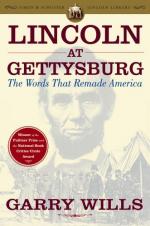|
This section contains 1,004 words (approx. 3 pages at 400 words per page) |

|
Chapter 4 Summary
Wills continues to trace the influence of abolitionist Theodore Parker's thought and political activism upon Lincoln. Then he points to two other leading Whig politicians of the times —Henry Clay and Daniel Webster— as other important influences on Lincoln's thinking and framing of the issues in his Gettysburg address.
Henry Clay was a slaveholder from Kentucky who was a master at getting the two sections of the country to compromise. He fought for the peaceful preservation of the Union through compromise and legislation during his thirty-year career in the Senate and House of Representatives. Clay was a leading orator of his time, and worked toward gradual emancipation. Lincoln borrowed many ideas from Clay, but he thought Clay should have condemned slavery and supported the ideas of the Declaration of Independence. Lincoln considered the Declaration, not the Constitution, to be our nation's...
(read more from the Chapter 4 Summary)
|
This section contains 1,004 words (approx. 3 pages at 400 words per page) |

|




